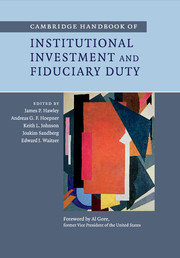Book contents
- Frontmatter
- Contents
- List of figures
- List of tables
- List of contributors
- Foreword
- 1 Introduction
- Part I Fiduciary duty: a global outlook
- 2 The public fiduciary: a Canadian perspective
- 3 The basis of fiduciary duty in investment in the United States
- 4 Governance and accountability in UK pension schemes
- 5 Institutional investment and fiduciary duty in Australia
- 6 The regulation of institutional investment in Sweden: a role model for the promotion of responsible investment?
- 7 The Dutch pension system
- Part II Fiduciary duty and the landscape of institutional investment
- Part III Challenging conventional wisdom on fiduciary duty
- Part IV Towards a broader interpretation of fiduciary duty
- Part V Beneficiaries’ roles and viewpoints
- Part VI Fiduciary duty and governance
- Index
- References
7 - The Dutch pension system
Published online by Cambridge University Press: 05 April 2014
- Frontmatter
- Contents
- List of figures
- List of tables
- List of contributors
- Foreword
- 1 Introduction
- Part I Fiduciary duty: a global outlook
- 2 The public fiduciary: a Canadian perspective
- 3 The basis of fiduciary duty in investment in the United States
- 4 Governance and accountability in UK pension schemes
- 5 Institutional investment and fiduciary duty in Australia
- 6 The regulation of institutional investment in Sweden: a role model for the promotion of responsible investment?
- 7 The Dutch pension system
- Part II Fiduciary duty and the landscape of institutional investment
- Part III Challenging conventional wisdom on fiduciary duty
- Part IV Towards a broader interpretation of fiduciary duty
- Part V Beneficiaries’ roles and viewpoints
- Part VI Fiduciary duty and governance
- Index
- References
Summary
Introduction
Pensions are a subject of great financial importance. On the micro-level, the pension is a significant factor in people’s financial planning. Almost every employee builds up a pension. In most cases it is possible to say that employees work one day a week for their pension. For the employer, the pension is an expensive employment benefit, which can have a decisive impact on companies’ balance sheet ratios and financial results. From a macroeconomic perspective, the importance of pensions is paramount, especially in the relatively small economy of the Netherlands. The pension sector manages approximately €950 billion (2013) of assets for so-called supplementary pensions in the Netherlands, which are mostly funded through legally compulsory schemes.
People in the Netherlands have high expectations with regard to their ultimate pension, but the fulfillment of those expectations is coming under pressure from factors such as the ageing of the population and unforeseen circumstances arising during the term of the pension contract. Both factors can result in people facing disappointment with regard to their pension. This is referred to as the “gulf in pension expectations.” It undermines trust in the financial system and in the economy as a whole, thereby impairing the pension system itself. This requires not only supervision aimed at strengthening the system but also a revision of the system itself.
- Type
- Chapter
- Information
- Publisher: Cambridge University PressPrint publication year: 2014



